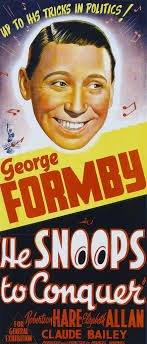He Snoops to Conquer
| He Snoops to Conquer | |
|---|---|
 |
|
| Directed by | Marcel Varnel |
| Produced by | Marcel Varnel Ben Henry |
| Written by | Stephen Black Norman Lee Howard Irving Young Langford Reed |
| Starring |
George Formby Robertson Hare Elizabeth Allan |
| Music by |
Harry Bidgood Eddie Latta |
| Cinematography | Roy Fogwell |
| Edited by | Max Brenner |
|
Production
company |
|
| Distributed by | Columbia Pictures |
|
Release date
|
12 December 1944 |
|
Running time
|
103 mins |
| Country | United Kingdom |
| Language | English |
He Snoops to Conquer is a 1944 British comedy film directed by Marcel Varnel and starring George Formby, Robertson Hare, Elizabeth Allan, and Claude Bailey. Its plot involves an odd job man who becomes mixed up in corruption in politics and town planning. Its title is a paronomasia of the famous comedic play, She Stoops to Conquer.
The film is set in immediate post-war Britain. After being ordered to do a piece on town planning two newspapermen randomly pick on the small, industrial town of Tangleton. After arriving at the town hall the only man they can find working is the odd job man, George Gribble, who gives them a guided tour of the town. However, they run a negative angle on the story highlighting the fact that the wealthy leader of the council, Mr Oxbold, lives in a giant house by himself while Gribble is one of fourteen staying in a tiny slum house. When they read the article, the town's leaders order Gribble to do a public opinion investigation around the town. Instead of doing a cross section as ordered, he interviews the entire town's population. The results he produces shock the town's complacent leaders, who discover the people are deeply unhappy with the status quo and wants radical changes in living conditions and other services. This is a blow to the council leader and his colleagues who all have financial interests in keeping the town as it is. Oxbold is a slum landlord who fears a Whitehall scheme to demolish much of the existing town and rebuild it with council houses. To avert this, Oxbold and his colleagues decide to send off to London only those limited number of forms which praise the current situation. Gribble is ordered to burn the rest but, not wishing to waste paper, he puts them out for salvage instead.
...
Wikipedia
